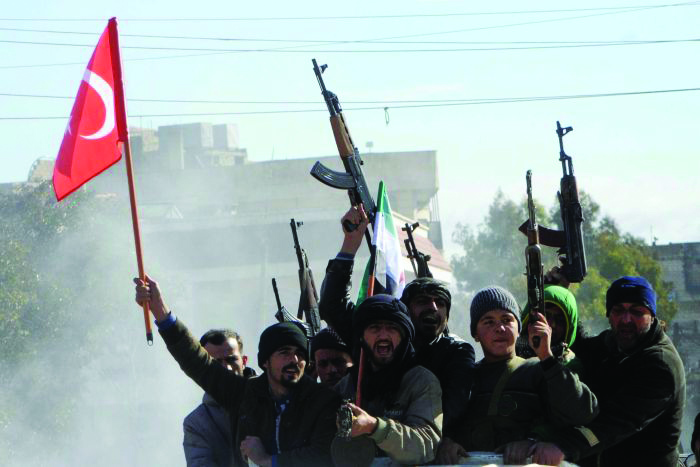Beginning on Saturday, Free Syrian Army rebels backed by the Turkish Armed Forces began an assault on northern Syria’s Afrin region.
The attack marks a significant escalation in the ongoing conflict between Kurdish forces in Syria and Turkish-backed groups. Turkish jets and artillery have been pounding the border region while observers report the presence of Turkish tanks amongst the rebel groups.
The new operation, dubbed Olive Branch by the Turkish military, has been fiercely resisted by Kurdish militia fighters who retook control over several towns seized by Turkish-backed forces in the early hours of the assault.
This new front in Syria’s multifaceted civil war is increasing the strain on the relationship between NATO members, Turkey, and the United States, as the Kurdish militia fighting in Afrin is the same organization supported by the US led anti-ISIS coalition.
The Afrin Kurds, part of the Democratic Union Party (PYD), are also affiliated with the Kurdistan Workers Party (PKK), the leading party in the decades-old insurgency in southeast Turkey. The PKK is a recognized terrorist organization in both the United States and Turkey, and the PYD’s close affiliation with the PKK has led Turkey to brand the Syrian group as a “terrorist army.”
Despite the PYD affiliation with the PKK, the Kurdish militia has become the United States’ main ally on the ground in Syria. PYD fighters form the core of the Syrian Democratic Forces (SDF), who have liberated vast swathes of northeast Syria from ISIS control, including its former capital of Raqqa.
The SDF now control roughly a quarter of Syria’s territory, including many of its major oil fields, agricultural lands, and a hydroelectric dam.
On January 13, the United States declared its intention to keep the 2,000 American soldiers currently in Syria working with the SDF for an open-ended commitment to prevent the resurgence of ISIS. Part of this plan entailed the creation of a 30,000 strong “border control” force, which would police the edges of SDF controlled territory, including much of the Syrian-Turkish border, as well as the Euphrates river valley where SDF territory meets areas controlled by the Syrian regime and Iranian backed militias.
The United States hopes to use the SDF as leverage against Russia and Iran as the Syrian Civil War appears to be entering its final stages.
The plan was to force a split between Russia and the Syrian regime/Iranians by establishing conditions on the ground that would make it impossible for the Syrian regime to claim military victory. The hope is that in such a case, Russia’s interest in acting as the lead negotiator of the war’s resolution would lead the country to pressure the Syrian regime and its hardline allies for concessions, including the possible removal of President Bashar al-Assad.
The United States’ border force plan was immediately rejected by Turkish leaders, and, despite attempts by the United States to walk back earlier statements, the Turkish government appears set on establishing its own conditions on the ground.
While Afrin lies outside of the main SDF controlled area, the Turkish attack has led many in the SDF to call for the movement of core SDF troops to the isolated province in order to fight the Turkish incursion. The Turkish government has also suggested it will move on the Syrian city of Manbij after taking control of Afrin, which would bring it into direct conflict with the main SDF force, as well as American advisors.
Even more troubling, Turkey’s intervention in Afrin could not have come without the support of Russia, who controls Afrin’s airspace and who has long kept Russian soldiers in the region. Close cooperation between Russia and Turkey raises questions about Turkey’s NATO commitments, while experts also speculate that Russia’s non-intervention was bought at the price of Turkey turning a blind eye to Syrian/Iranian/Russian advances against Turkish-backed Syrian rebels in the Idlib province, the last bastion of rebel control in Syria.
While it is impossible to predict where the infinitely complex Syrian Civil War will go from here, it is clear that the new conflict in Afrin has the potential to be a game changer.



